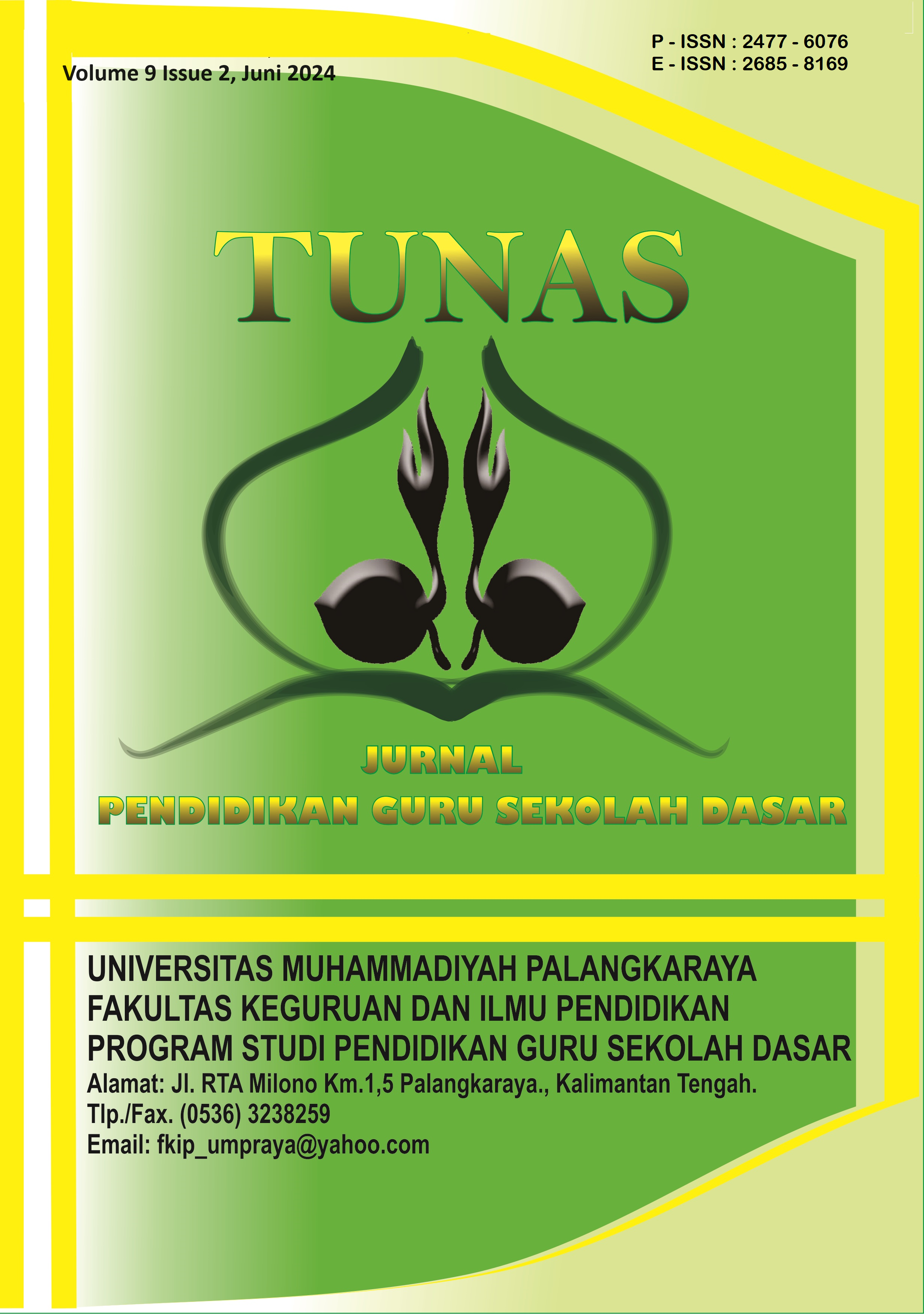The Effect of Self-Regulated Learning on Student Academic Procrastination
Main Article Content
Abstract
Background: This also happens to PGSD students. Based on observations, show that the majority of students have carried out academic procrastination such as delaying doing coursework, delaying studying when facing exams, and sometimes choosing to do things that are more fun and unrelated to academic assignments. The emergence of academic procrastination behavior is caused by several factors, including low intrinsic motivation, laziness in studying, lack of discipline in the way parents educate them, influence from friends in their environment, as well as a lack of self-regulated learning (SRL) in managing time for doing assignments with other things. Aim: This study aims to determine the effect of self-regulated learning on academic procrastination of Muhammadiyah University students of Palangkaraya. Method: This type of research is quasi-experimental research. The population of this study was 2714, while the sample was 349 students. Data were collected by using several instruments in the form of an academic procrastination scale and a self-regulated learning scale. Statistical testing using linear regression analysis. Results and Dıscussion: The results of the study indicated that the significance value is 0.025 <0.05. Conclusion: It can be concluded that there is a significant influence on the self-regulated learning on academic procrastination of Muhammadiyah University students of Palangkaraya.
Downloads
Article Details

This work is licensed under a Creative Commons Attribution-ShareAlike 4.0 International License.
Authors who publish with this journal agree to the following terms:
- Any article on the copyright is retained by the author(s).
- The author grants the journal, right of first publication with the work simultaneously licensed under a Creative Commons Attribution License that allows others to share work with an acknowledgment of the work authors and initial publications in this journal.
- Authors are able to enter into separate, additional contractual arrangements for the non-exclusive distribution of published articles of work (eg, post-institutional repository) or publish it in a book, with acknowledgment of its initial publication in this journal.
- Authors are permitted and encouraged to post their work online (e.g., in institutional repositories or on their websites) prior to and during the submission process, as can lead to productive exchanges, as well as earlier and greater citation of published work.
- The article and any associated published material is distributed under the Creative Commons Attribution-ShareAlike 4.0 International License
References
Astuti, A. D., & Wangid, M. N. (2018). Self-Regulated Learning Ability of Elementary School Students in Learning Mathematics. Journal of Physics: Conference Series, 1108(1).
Basri, A. S. H. (2018). Prokrastinasi Akademik Mahasiswa Ditinjau Dari Religiusitas. Hisbah: Jurnal Bimbingan Konseling Dan Dakwah Islam, 14(2).
Chotimah, C., & Nurmufida, L. (2020). Pengaruh Self Regulated Learning Dan Pola Asuh Orang Tua Terhadap Prokrastinasi Akademik Mahasiswa. J-MPI (Jurnal Manajemen Pendidikan Islam), 5(1), 55. https://doi.org/10.18860/jmpi.v5i1.7850
Clarebout, Horz, & S. (2016). The relation between self-regulation and the embedding of support in learning environments Author ( s ): Geraldine Clarebout , Holger Horz , Wolfgang Schnotz and Jan Elen Source : Educational Technology Research and Development , Vol . 58 , No . 5 ( Octob. 58(5), 573–587. https://doi.org/10.1007/sl.
Elstad, E., & Turmo, A. (2014). Research in Science & Technological Education Students ’ self ‐ regulation and teachers ’ influences in science : interplay between ethnicity and gender. December. https://doi.org/10.1080/02635143.2010.501751.
Fathoni, A. R., Indrawati, E. (2022). Pengaruh Self-regulated Learning dan Motivasi Berprestasi Terhadap Perilaku Prokrastinasi Akademik Siswa. Jurnal Indonesia Sosial Sains, 3(7). https://doi.org/10.36418/jiss.v3i7.646.
Ferrari, Johnson, and McCown, Procrastination and Task Avoidance (New York: Plenum Press,1995), 82.
Ghozali, I. (2013). Aplikasi Analisis Multivariate dengan Program IBM SPSS (Edisi Ketujuh). Badan Penerbit Universitas Diponegoro.
Hair, J. F., Black, W. C., Babin, B. J., Anderson, R. E., & Tatham, R. L. (2014). Pearson new international edition. In Multivariate data analysis, Seventh Edition. Pearson Education Limited Harlow, Essex.
Jantz, C. (2011). Self-regulation and online developmental student succes. Journal of Online Learning and Teaching, 6(4), 852–857.
Kolovelonis, A., Goudas, M., & Dermitzaki, I. (n.d.). International Journal of Sport and The effects of self-talk and goal setting on self-regulation of learning a new motor skill in physical education. December 2014, 37–41. https://doi.org/10.1080/1612197X.2012.671592
Naderi, K., NeshatDoost, H. T., & Talebi, H. (2021). Evaluating the Effectiveness of Self-regulation Strategy Training on Procrastination, Happiness and Academic Achievement. Journal of Clinical Research in Paramedical Sciences, 10(1). https://doi.org/10.5812/jcrps.100923
Rizanti, F. dan M. (2013). Hubungan antara Self Regulated Learning dengan Prokrastinasi Akademik dalam Menghadal Al-Quran pada Mahasantri Ma’HAD ’ALY Masjid Nasional Al-Akbar Surabaya. Jurnal Penelitian Psikologi., 02(01), 1–7. http://ejournal.unesa.ac.id/data/journals/17/articles/4582/public/4582-7136-1-PB.pdf
Sandya, S. N., & Ramadhani, A. (2021). Pengaruh Intensitas Bermain Game Online Terhadap Prokrastinasi Akademik Mahasiswa. Psikoborneo: Jurnal Ilmiah Psikologi, 9(1), 202. https://doi.org/10.30872/psikoborneo.v9i1.5680
Sierens, E., Vansteenkiste, M., Goossens, L., Soenens, B., & Dochy, F. (2009). The synergistic relationship of perceived autonomy support and structure in the prediction of self-regulated learning. British Journal of Educational Psychology, 79(1), 57–68. https://doi.org/10.1348/000709908X304398
Steel, P., & Klingsieck, K. B. (2016). Academic Procrastination: Psychological Antecedents Revisited. Australian Psychologist, 51(1), 36–46. https://doi.org/10.1111/ap.12173
Stussi, Y., & Sander, D. (2019). Achievement motivation modulates Pavlovian aversive conditioning to goal-relevant stimuli. Npj Science of Learning, September 2018. https://doi.org/10.1038/s41539-019-0043-3
Sugiyono. (2013). Metode penelitian pendekatan kualitatif, kuantitatif, dan R & D. CV. Alfabeta.
Wolters, C. A., Pintrich, P. R., & Karabenick, S. A. (2006). Assessing Academic Self-Regulated Learning. What Do Children Need to Flourish?, 2003(March), 251–270. https://doi.org/10.1007/0-387-23823-9_16
Ying, Y., & Lv, W. (2012). A Study on Higher Vocational College Students’ Academic Procrastination Behavior and Related Factors. International Journal of Education and Management Engineering, 2(7), 29–35.
Zhu, Y., Au, W., & Yates, G. (2016). Internet and Higher Education University students ’ self-control and self-regulated learning in a blended course. The Internet and Higher Education, 30, 54–62. https://doi.org/10.1016/j.iheduc.2016.04.001
Zimmerman, B. J. (2002). Zimmerman - 2002 - Becoming a Self-Regulated Learner An Overview. 41(2), 64–70.
